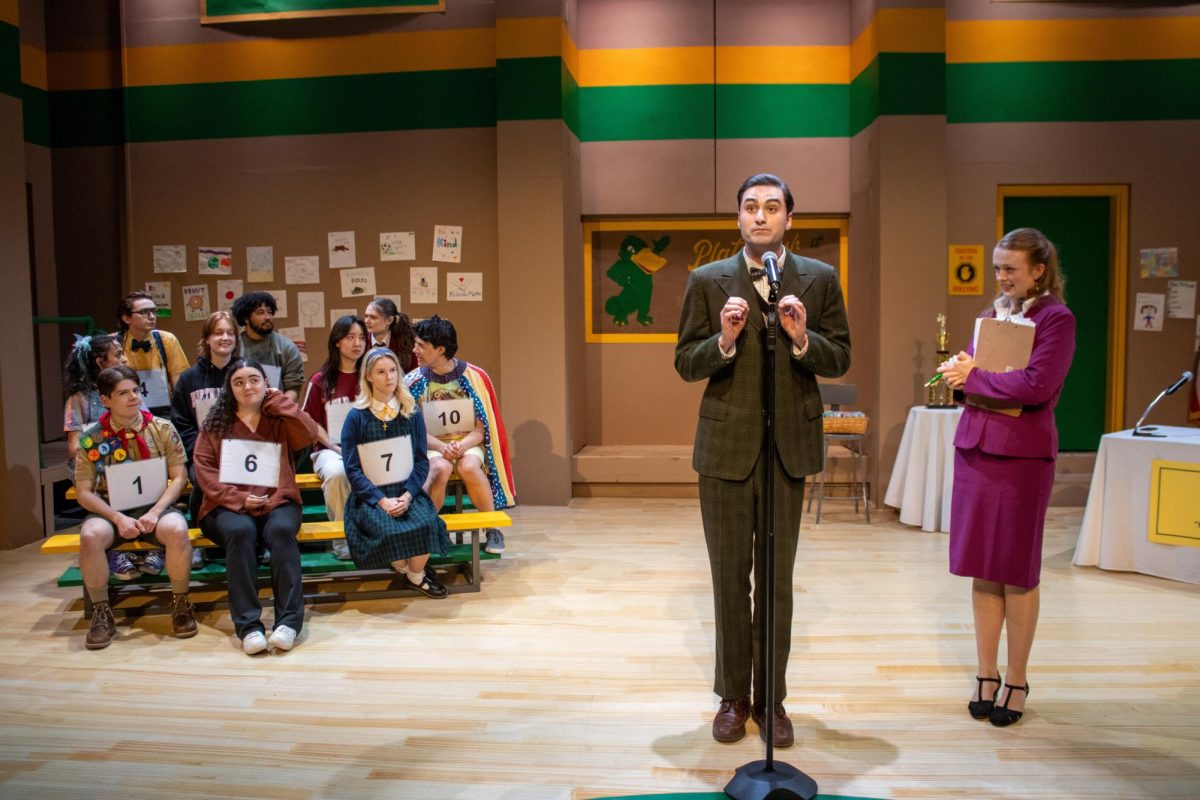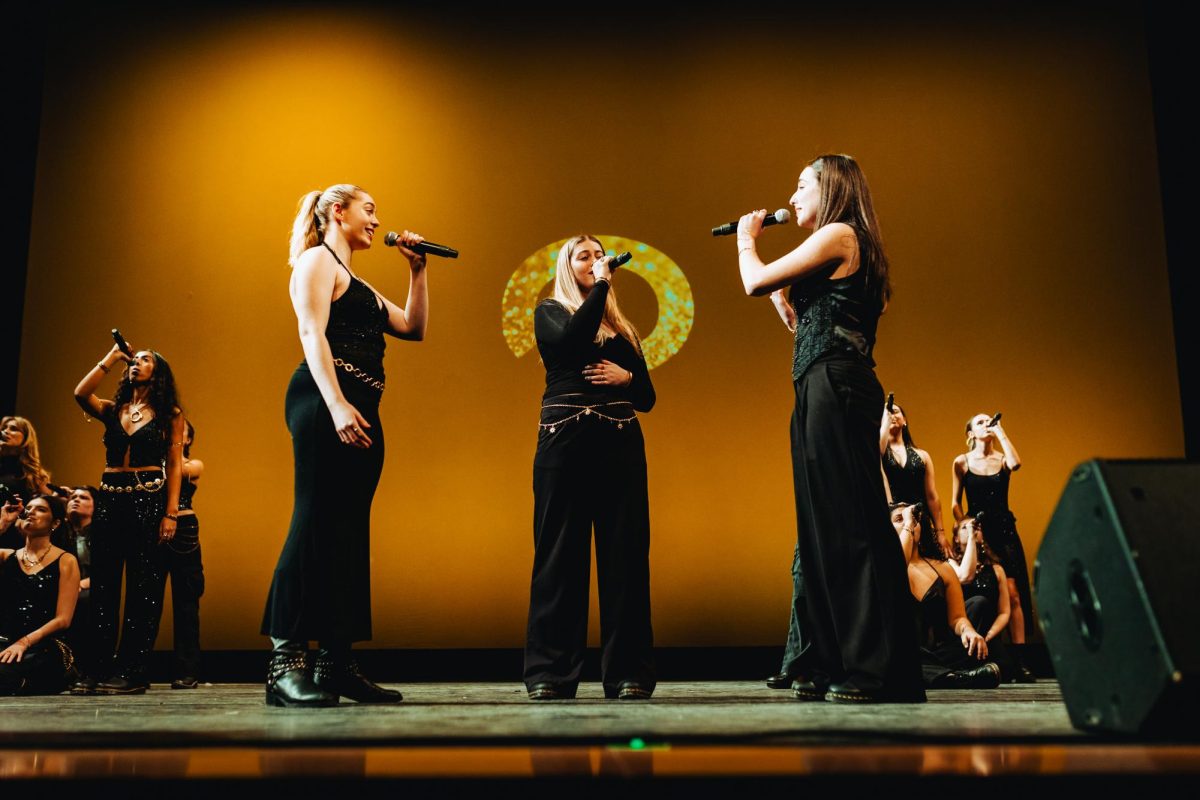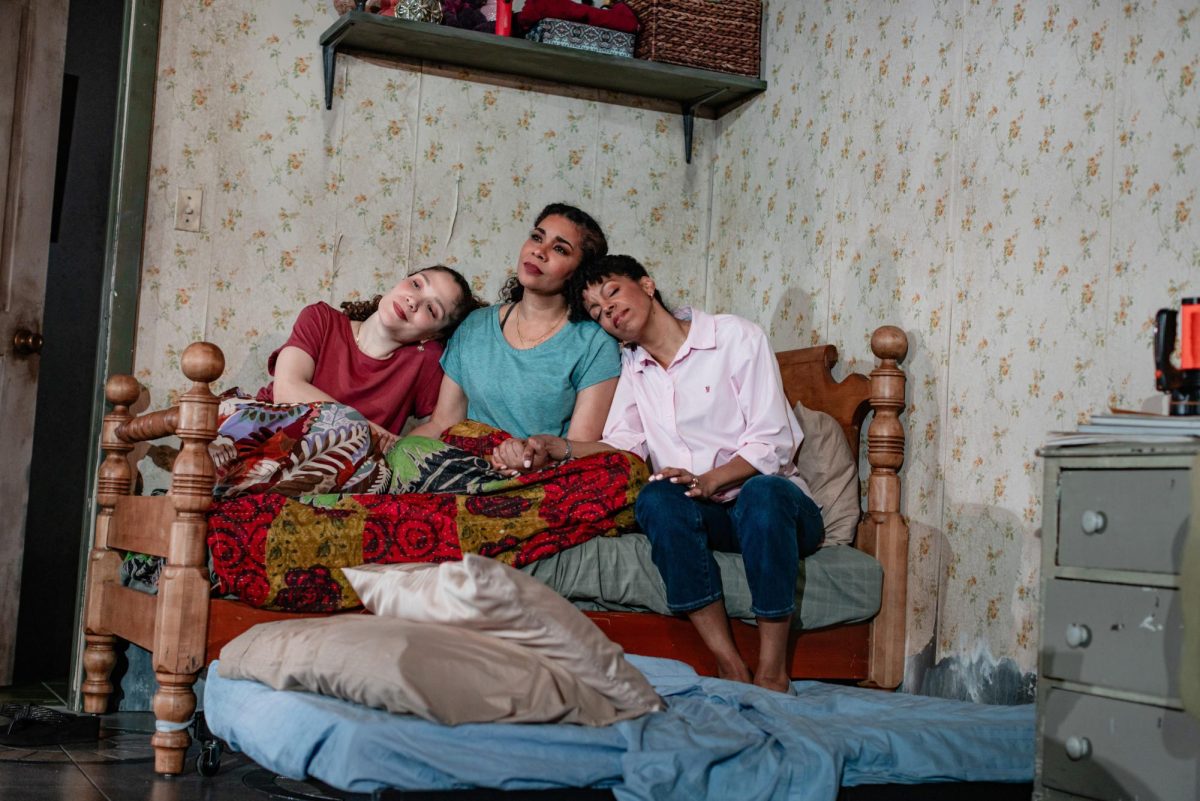C-H-I-L-D means “a young person especially between infancy and puberty,” according to Merriam-Webster. But a dictionary can’t tell you what goes on inside a child’s mind, their story or their background.
The Northeastern Department of Theatre’s spring production featured the award-winning Broadway musical “The 25th Annual Putnam County Spelling Bee.” Directed by Brian Jones, the production starred Northeastern student actors, including in-major and non-theatre students, and ran from March 27 to April 6 at the Studio Theatre in Curry Student Center.
“This is a pretty ensemble-intensive show,” said Gabriella Purvis, a first-year cell and molecular biology major who played Olive Ostrovsky. “The best thing about the show is the element of surprise, but be prepared to laugh a lot, and don’t be afraid to make noises during the performance.”
The musical, written by Rachel Sheinkin and composed by William Finn, started out as Rebecca Feldman’s “C-R-E-P-U-S-C-U-L-E,” a play by the Farm, an improv group. The three collaborated and transformed the improv play into a full-length musical production; it premiered at Barrington Stage Company in Pittsfield before moving to the Circle in the Square Theatre, where it gained attention from theatre lovers. “Spelling Bee” received a Tony Award, a Drama Desk Award, a Lucille Lortel Award and two Theatre World Awards for its outstanding and carefree creativity.
The play is a comedic musical production tracking six eager and passionate kids whose enthusiasm for spelling??? slowly reveals each of their backstories. Lively, candid, improvisational and impulsive, these young kids spell their way through the competition with both commonly-known and made-up words.
Adult audiences may think that these kids are taking the spelling bee too seriously, but the music, character relationships and acting choices reveal their motivations: to get the words down letter-by-letter. As champions of their own district’s spelling bees, they are held to high expectations by both their parents and themselves.
Children’s drawings covered the wall leading into the Studio Theatre to reveal the immersive set of an elementary school gym. A wooden piano, a lost-and-found corner, achievement flags and benches: every detail of the set transformed the black box theatre into a room of nostalgia.
It is overwhelming to imagine a 90-minute show that features the stories of six kids and three adults, but the production may surprise you. The flow of the spelling bee was rather fluid, uninterrupted and captivating.
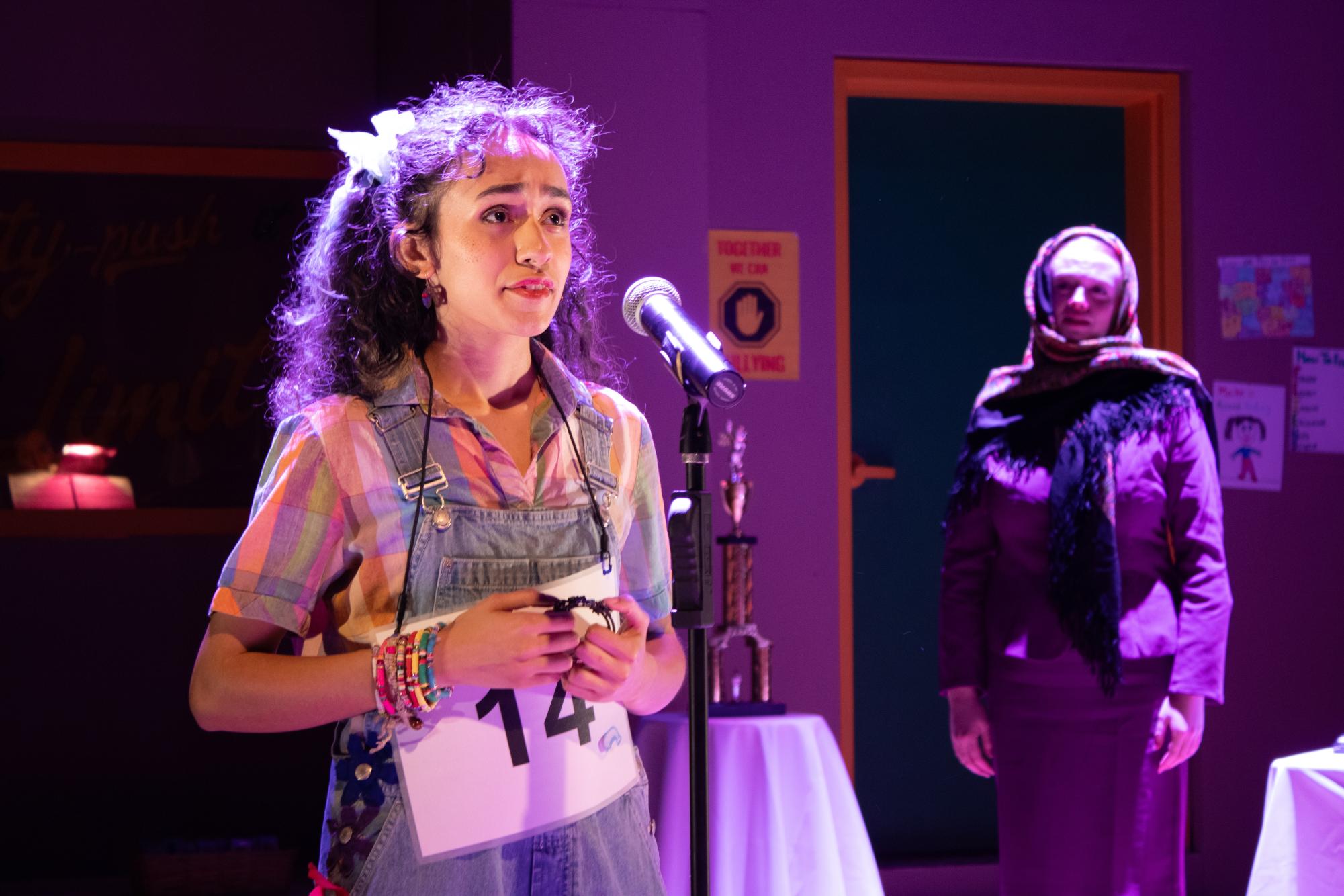
The characters not only showcased their personality through their interactions with each other but also had their own songs. Some kids had a different tactic of spelling; some just “clicked” into their zone, some got the word right away and some had a personal story attached to the words they were given.
As the musical unfolds, each kid’s struggles are revealed, ranging from absent parental figures and high parental expectations to even having an erection mid-competition. These familiar and relatable struggles bridge the audience to the characters on stage.
Before coming to Northeastern, Purvis performed in “Spelling Bee” in her junior year of high school as Logainne “Schwartzy” Schwartzandgrubenierre, the high-achieving, politically aware and youngest contestant whose purpose of competing is to make her fathers proud.
“[Olive Ostrovsky] is such a sweetheart,” Purvis said. “I’m trying to take good care of her as a character as I can. When I did the show as Schwartzy, I was very high-strung and anxious trying to be number one. But now, as I’m doing the show in a different time of my life, I feel more connected to Olive as a character.”
In order to regulate the production, the roles of Douglas Panch, the vice principal of the local high school, and Rona Lisa Peretti, the bee’s host, required dense improvisational acting skills.
The characters were played by fourth-year theatre major Noah Braunstein and fifth-year theatre and communication studies combined major Brenna Thornton, respectively.
Not only were the six kids participating in the spelling contest, but four members of the audience were also invited to the stage as spellers.
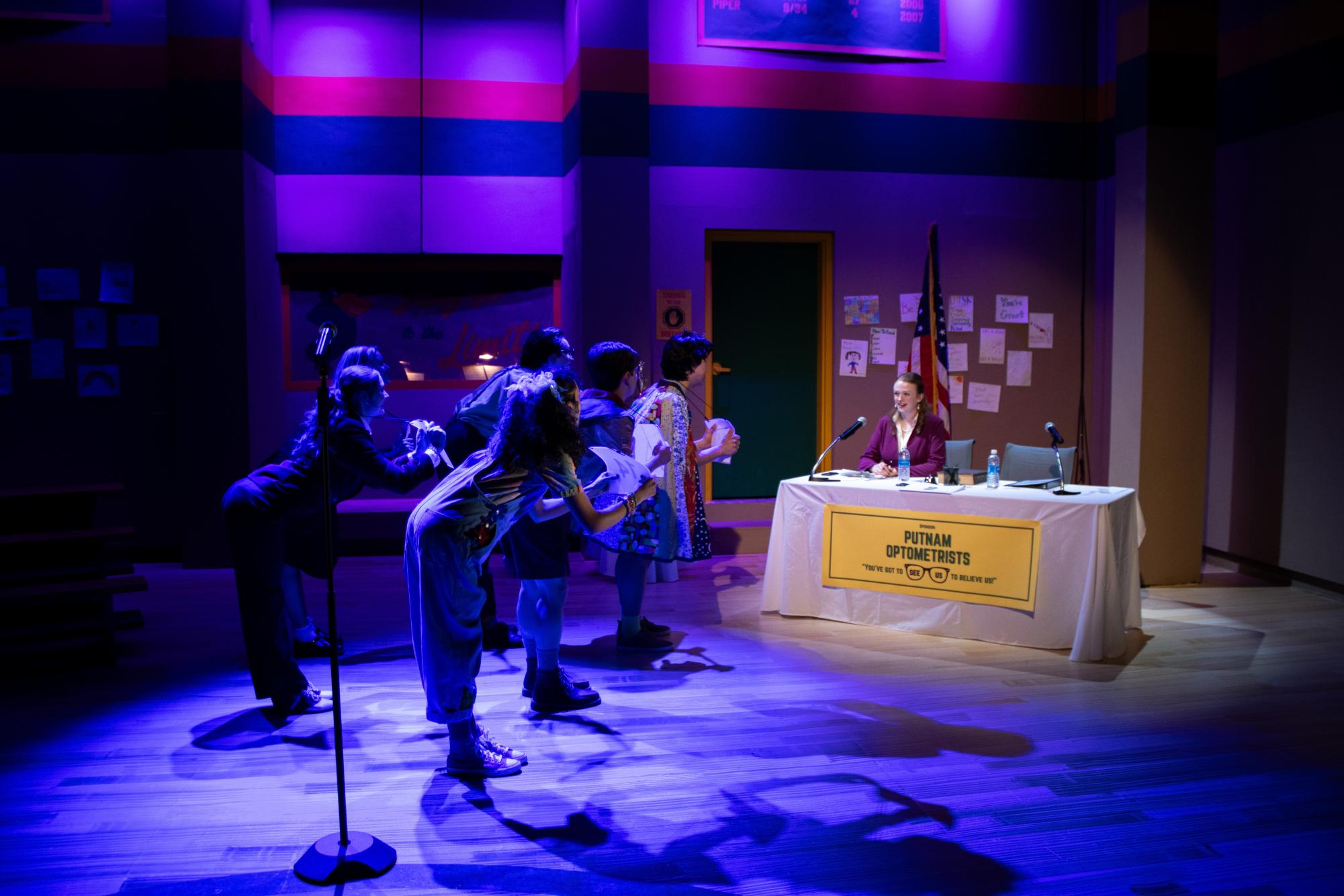
“If you want the audience to respond well to you, you have to invite them to do so,” Braunstein said. “It would be really easy to put a whole bunch of unnecessary pressure on those audience members, and if I did that, the show would shut down because the audience would disengage.”
Even with its interactive elements, “Spelling Bee” still follows a script to keep the story’s smooth flow. In some unplanned moments, the spelling bee regulators need to activate their problem-solving skills.
“I learned my lines for each [spelling segment], but I would constantly forget the order of the segment, and, during rehearsal, I would call people up at the wrong time,” Braunstein said. “Eventually, the director told me to write it all down. And yet, in the first two performances, I still managed to skip [William Barfée] even though I was looking at the list.”
“Spelling Bee” has its ups and downs. Audience members simultaneously experienced the characters’ sadness when they were called “dumb,” happiness when one of the children won the bee and relief when some released themselves from perfectionism. They even felt love when characters made a new friend at the competition.
“I have never seen ‘The 25th Annual Putnam County Spelling Bee’ before, but a lot of my friends worked on it and are in it,” said Abby Barton, a second-year communication studies and theatre combined major. “I had a smile on my face the entire time.”
The cheeky moments of the production will capture your attention, but the deep messages behind the characters’ pure passion for the spelling bee will capture your mind, heart and inner child.
As it is printed on the fictional sponsor poster for the spelling bee: “Putnam Optometrists — You’ve got to see us to believe us.”



